2019 Unrig Summit Celebrates Historic Victories Over Two-Party Duopoly

A Roadmap to A Better Democracy
By: Wes Messamore
Reform activists from around the country gathered in the Country Music Capital of the World –– Nashville, Tennessee –– over the last weekend in March to celebrate an absolute tidal wave of policy victories in 2018; listen to inspirational speeches; share and learn the nuts and bolts of policy reform; and even to air fierce differences of opinion over the best way to reform elections in America and over other areas of public policy. How they buzzed!
Like honey bees that go out to gather information and resources that keep the hive alive and thriving, then gather in their conclaves on the prismatic comb to tell each other which way each had gone when they found something good to bring back to their friends, drawing a road map of opportunities these activists discovered by wandering off the map of status quo democracy:
They waxed eloquent in the rooms of the Nashville Music City Center on panels, in workshops, during debates, and with TED-style presentations on the Unrig Spark! Stage.
In total there were more than two dozen victories for election reform from coast-to-coast in 2018, at all levels of government — from anti-gerrymandering measures to anti-corruption initiatives to voter re-enfranchisement amendments to innovative alternative voting methods.
TFW listing off all the states where the election reform movement made a policy breakthrough in 2018:
By the way–– is Howard Dean's resemblance in both appearance and manner to Andy Bernard from NBC's The Office not uncanny?
Hat tip: GIPHY
He could really play him in a blockbuster Hollywood film about the insurgent 2004 Howard Dean campaign for president! 😄
It was a campaign that was famous in its time for being the first modern, Internet, and data-driven political campaign. That could make a very compelling story with the Hollywood treatment.
And if Steve Carell can play Donald Rumsfeld to Christian Bale's Vice President Dick Cheney on the big screen, I don't see why not.
Which is kind of perfect, because Ed Helms was a headline speaker at the Unrig Summit this year, along with Jennifer Lawrence again, and potential 2020 independent presidential candidate and Starbucks founder and former CEO Howard Schultz.
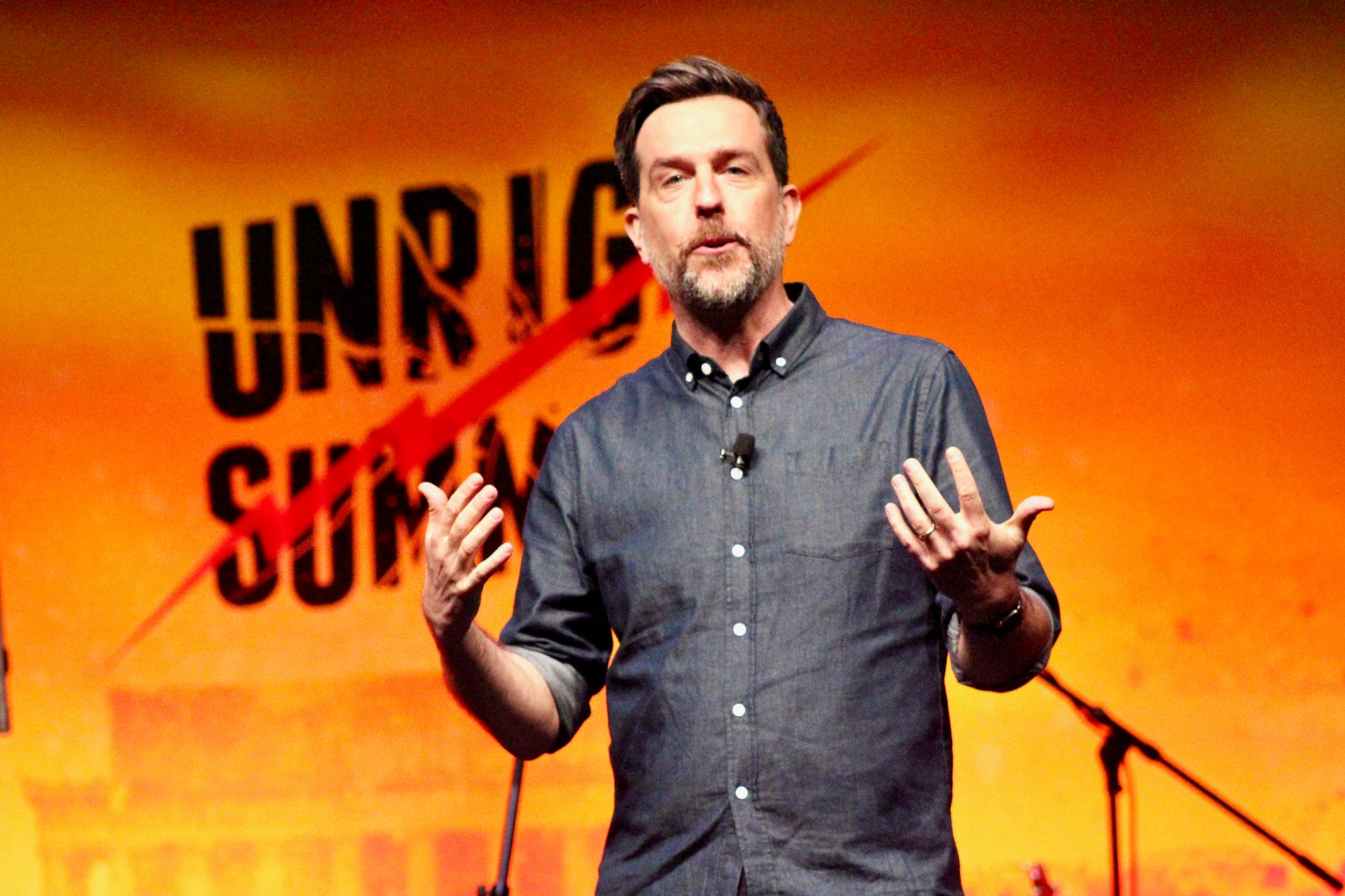
While Ed Helms and Jennifer Lawrence kept the summit audiences laughing and smiling during the election reform panel and Unrigged Live, Howard Schultz brought a somber message of reflection about the crisis of character facing our country's politics today.
But the attendees weren't at the Unrig Summit to see famous celebrities or wildly successful business people.
The real stars of the show were the dedicated activists who hard pumped the election reform ratchet in 2018...
At The Unrig Summit, Activists Proved "Titles Are Good, But Purpose Is Better"
By Shawn Griffiths
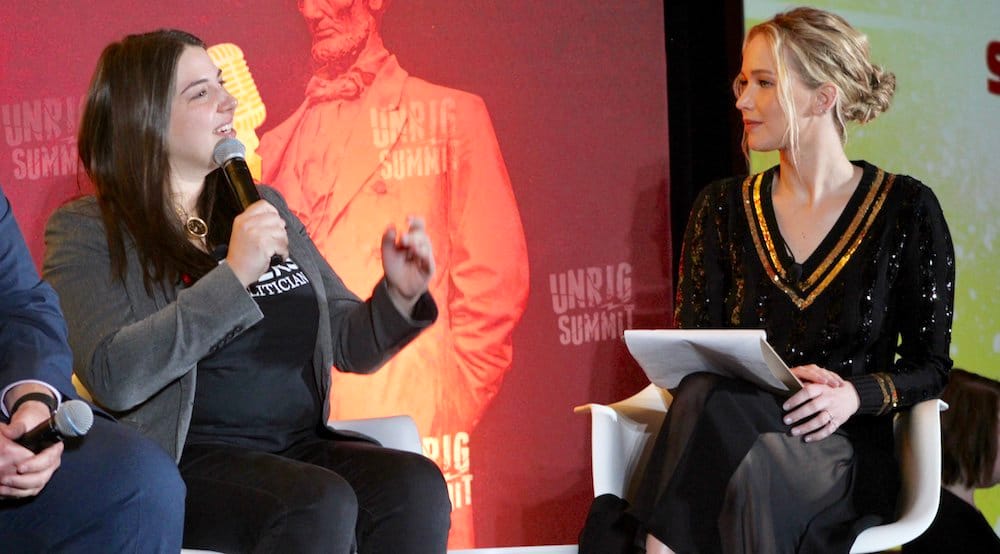
It is no coincidence that 2018 was such a historic year.
Reformers are mobilizing like never before as the systemic and institutional problems in our duopolistic political system continue to get worse, and voters have had enough:
- Most voters think neither party represents them;
- Most voters want more choice in elections; and
- Most voters think our current political path is unsustainable.
In Michigan, a single Facebook post turned into an anti-gerrymandering campaign and voter initiative that won the ballot with over 60% of the votes last November.
“I accidentally made a Facebook post that led to a political movement that ended gerrymandering in Michigan,” said Katie Fahey, founder and executive director of Voters Not Politicians, during a panel discussion moderated by Jennifer Lawrence.
In Maine, ranked choice voting (RCV) advocates mobilized citizens to pass and then protect a statewide RCV bill that state politicians tried to repeal. Volunteers braved blistering cold temperatures in one of the worst recorded winters in Maine’s history for the cause.
“You can have more voice if you have more choice. The politicians shouldn’t draw their own districts, or decide how to run the elections, or decide how they’re going to fund their campaigns,” said Kyle Bailey, campaign manager for the Committee for Ranked Choice Voting 2020. “You, the people, have the power to decide how elections will work and how your representatives will govern.”
In North Dakota, a team of “badass grandmas” led a campaign to enact sweeping anti-corruption measures that promote greater transparency and accountability in the state government.
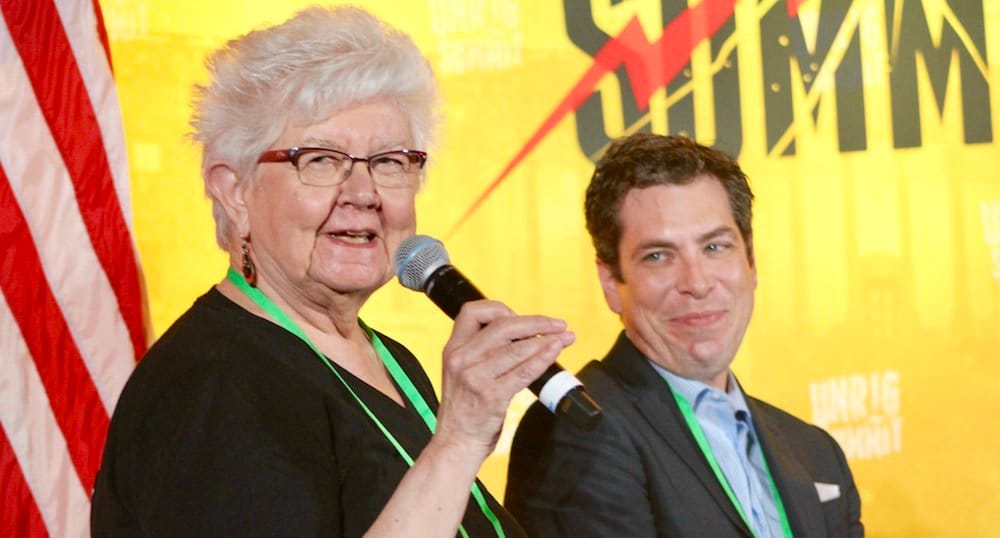
“I think we cleverly packaged a label, a brand, that my brilliant grandson and his friend had. They saw an early brochure of ours and his friend said, ‘Is that your grandma?’ And he said, ‘She’s badass,’” said Dina Butcher with North Dakotans for Public Integrity.
“The people found us to be authentic. At our age we don’t have anything personal to gain, we don’t have an agenda. The authenticity and our honesty in wanting to make North Dakota a better place for our grandkids did the trick.”
Similar stories came out of Missouri, Utah, Florida, and several other places -- stories of the disruptors who were willing to stand up against the political status quo that has left behind so many people.
These disruptors shared the stage at the Unrig Summit to share their experiences and the ultimate secret to how they won: It was not about funding. It was not about fancy titles. It was about the people -- ordinary people who were looking to do something extraordinary.
Citizen-led. Citizen-won.
“This was a special moment for everyone, because it really acknowledged who the most important people are,” said Joshua Graham Lynn in a podcast interview after the summit.
“A lot of the times when you go to something like this (the summit), and there’s some phenomenal speakers, there are people who have big titles, but the titles don’t matter quite as much as the people who are regular, everyday, average citizens who are just sick and tired of the status quo, and decided to do something about it, and prevailed.”
And Lynn wasn’t the only one inspired by this. His remark about “big titles” was a call back to something Bernie 2020 Co-Chair Nina Turner said during the opening plenary of the summit, reinforcing the theme that now is the time for citizens to rise up and take action to unrig the system.
“In this unprecedented time in our country’s history you may be asking yourself, what can I do? I’m from Tennessee, South Carolina, Florida, Ohio, Alabama, Illinois -- wherever you are from, all of us have the capacity to organize,” said Turner,
“Titles are good. I have a few of them. They get you phone calls. But if you get people caught up in their title and not their purpose, that’s not good. Titles are good, but purpose is better. We are purpose-driven people.”
It is no surprise that many at the summit remarked how optimistic they were about the future of reform in the US following these discussions. Like the people who are mobilizing these campaigns, the movements to increase competition, choice, voter empowerment, accountability, and transparency in the system are purpose-driven.
It gave summit attendees a reason to feel inspired.
Howard Schultz: The Centrist Savior From Our Impending Demise?
By: Shawn Griffiths
Howard Schultz has positioned himself in the political space as a “centrist independent,” emboldened by the demands for change to the political status quo.
Yet his message at Unrig 2019, like the rest of his speeches to date, was rather pessimistic.
“Never in my lifetime have I been so deeply and profoundly concerned about the direction of our country and the fracturing of our democracy,” he said at the Unrig Summit.
He said we are seeing nothing but “a lack of respect, civility, dignity in the White House.” He later added at the President Trump was “undermining our democracy, our values, our way of life.”
We can’t afford another term of Trump, he says. But neither can the country survive going down the path of socialism.
The country needs to elect someone at the top right now who will take power away from the Republican and Democratic Parties. Or else, the country will be lost, forever.
The solution for him is not specified, systemic reforms. The country either needs to just trust and elect him, or that's all folks.
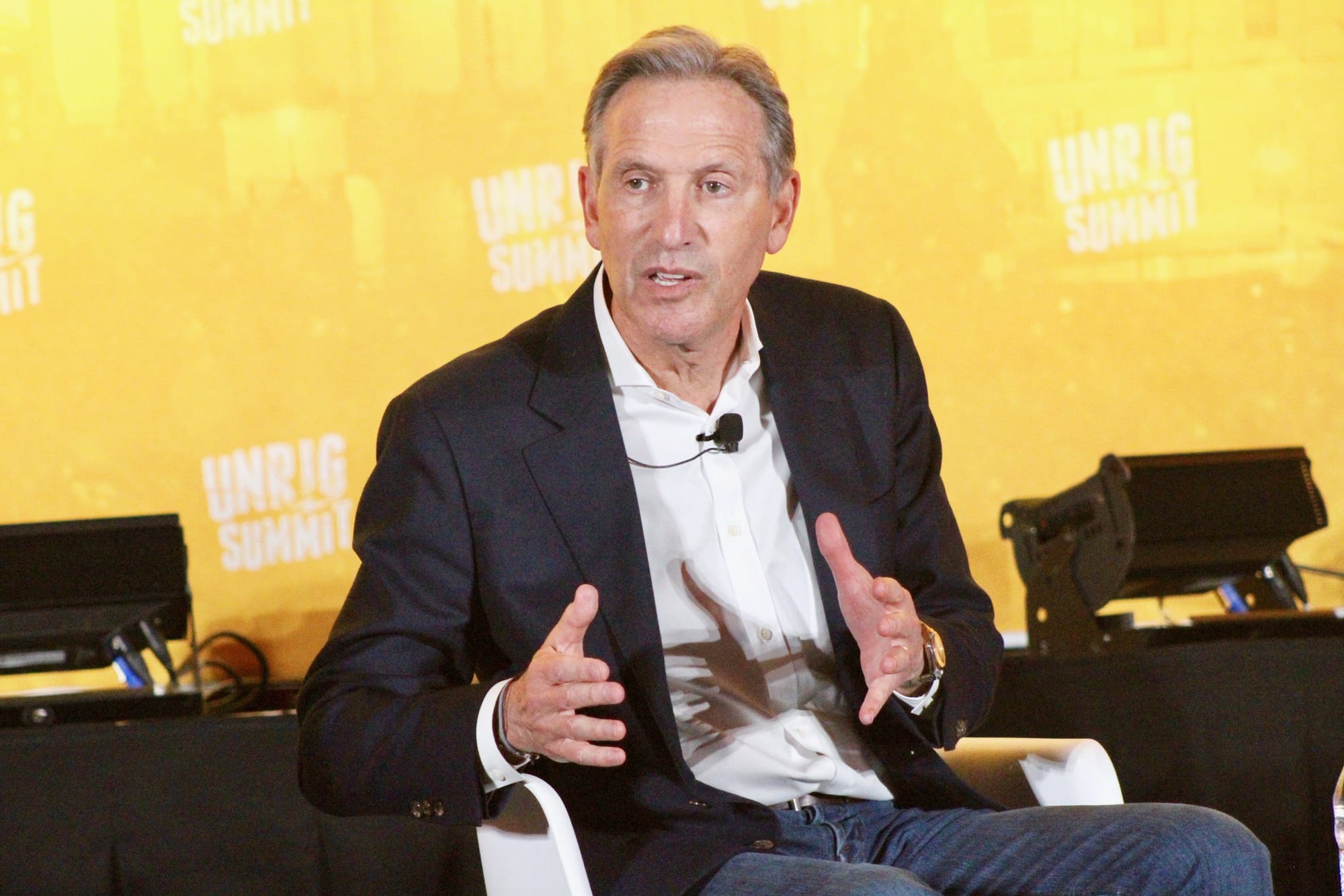
“All of these well intentioned people who are here, each of whom have their own issue -- whether it is the voting issue you talked about (ranked choice voting), whether it is term limits, whether it is lobbying, gerrymandering, all of these issues, I agree with almost every single one of them,” Schultz told me in a one-on-one interview.
“But, we can’t get to that over a 10 or 20-year period unless we change the system by removing the two parties in power in the oval office."
Schultz, whether he is cognizant of it or not, is using the same fear-based message voters get from the two major parties: Vote for me, because only I can save you from the scary future.
“We have to center ourselves around one, single opportunity, and come together, and I think one of the things that is necessary for the people here is that we have to rally behind one, single issue before we can deal with levels of reform that will take decades. We don’t have decades. This is a crisis. This is an emergency of a failed level of leadership and a corrupt system.”
The message may be even less palatable to reformers for two main reasons: (1) His message implies that our current tumultuous political environment is a recent manifestation, rather than a consequence of an institutionalized system, and (2) if we don’t have time to reform the system, reformers are just fighting in futility.
Inspiration be damned.
Schultz’s message at the Unrig Summit was a contrast to the message nonpartisan reformers were otherwise there to present, which was hope and optimism in the wake of the biggest year for election and political reform in modern US history.
These reforms passed overwhelmingly across the nation in 2018, from San Diego to Fargo, from Colorado to Maine, Michigan to Florida. They included independent/citizens’ redistricting commissions, alternative voting methods, anti-corruption measures, voter empowerment and re-enfranchisement initiatives, and more.
And the success of these reform efforts came regardless of who was in the Oval Office.
Voters are also all too familiar with presidential candidates who say their election is key to transforming the political process. They have already been burned by a promised era of hope and change, or a drained DC swamp, only to find the political environment get even more toxic.
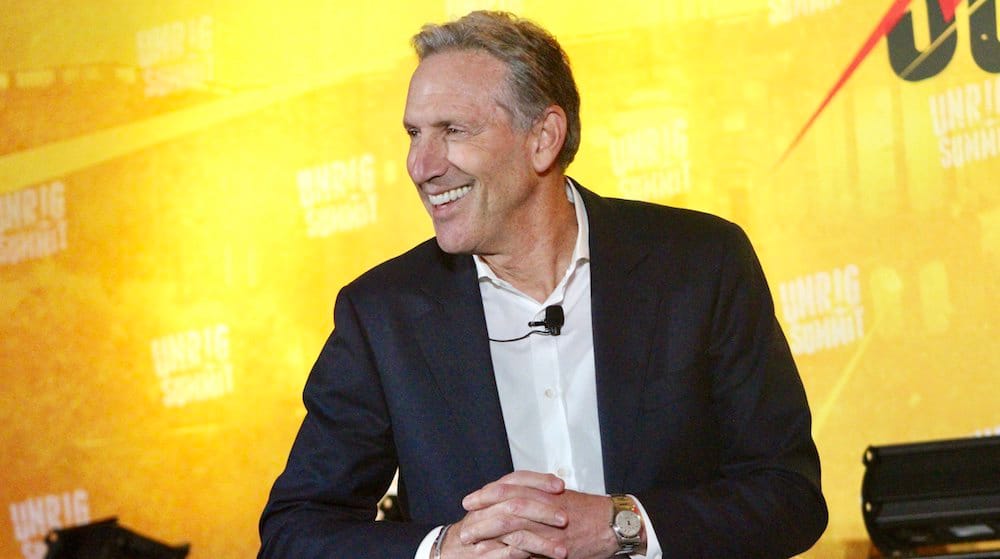
There is no doubt in my mind that Howard Schultz is sincere when he talks about the need to unite the country and transform the system. Sitting next to him for our one-on-one, he spoke with a deep level of conviction and a determination that can only come from someone who built a multi-billion dollar company from nothing, revolutionized an entire industry, and genuinely believes he can improve our collective future.
Schultz has great soundbites when speaking to reporters and to the crowd, but voters need more than words right now.
Schultz must resolve what is largely an inconsistent message on reform. He says he supports a number of reform proposals, that reformers should keep fighting, but also says these reforms must take a backseat to the election of a single person, himself. He says he will commit resources and influence to causes that are “vitally important to transforming the system,” just not right now.
He also says he understands the obstacles that have been put in the way of independent and third-party candidates, but speaks with absolute certainty that he will be immune to them should he run.
Ironically, he exudes the same sense of self that he derides elsewhere.
On debate access:
“I am convinced that if I run for president I will be on that debate stage, and I will be north of 15%, despite the fact that both parties have done everything humanly possible to create one obstacle after another to prevent that.”
On ballot access:
“One thing I can tell you is if I run for president, I will be on the ballot of every state. We have removed that obstacle.”
Schultz seems to underplay the barriers to political entry. And maybe he does have a solid plan to overcome them. But it wouldn't be the first time the two-party controlled system raised the barriers to prevent an outside entrant.
As former FEC Commissioner Trevor Potter said during Unrig, we have “outsourced the basic rules of our democracy to private companies.” And the two corporations that control all the levers of our political system are the Republican and Democratic Parties.
That's why the rules for an independent can change at any time.
Perhaps, this is why Schultz’s message fell flat among many of the people in attendance at the Unrig Summit.
Schultz doesn’t seem to connect the critical nature of reform efforts that would transfer power away from the parties, empower voters, and increase choice and political competition -- to making an outsider campaign like his more possible.
Instead, Schultz is convinced that the cart needs to follow the horse.
Nina Turner, "A Hellraising Progressive" Preaches Against Partisanship
By: Wes Messamore
Howard Schultz's pointedly discouraging message for Unrig activists was not received. By the time he took the stage Sunday, they were already fired up from all the encouragement and inspiration of headline speakers like Bernie Co-Chair and Our Revolution Board Member Nina Turner.
She kicked off the conference with a rousing call to action, based on the tested and proven belief that reformers don't have to win prominent elected offices to make a difference:
“We think the only way we can make change is to be a member of Congress, but nothing could be further from the truth.”
In Turner's view of the world, job titles (whether it's president of a non-profit or president of the United States) are good, but making measured progress toward a goal driven by a purpose is what wins:
“In this unprecedented time in our country’s history you may be asking yourself what can I do? I’m from Tennessee, South Carolina, Florida, Ohio, Alabama, Illinois–– wherever you are from all of us have the capacity to organize. Titles are good. I have a few of them. They get you phone calls. But if you get people caught up in their title and not their purpose, that’s not good. Titles are good, but purpose is better. We are purpose driven people.”
She also took some hard and very funny swipes at partisanship:
“It’s not about political partisanship, it’s not about political affiliation. When I was born the doctor didn’t pull me or you out and say this is a nice Democrat here. This is a nice Republican here. Your parents were looking to see if you had ten fingers and ten toes and thinking about how they could make your life better, not if you’re going to grow up to be a Democrat or a Republican.”
And she left the activists with one important question:
“What are we willing to sacrifice for it? We don’t have to lose our lives or livelihoods for it. But what are we going to sacrifice? Whether it’s your time your talent or your treasure, we have to put something on the line to unrig the system for our country, for ourselves, for future generations.”
A Renaissance of Voting Reform at The Unrig Summit
By: Wes Messamore
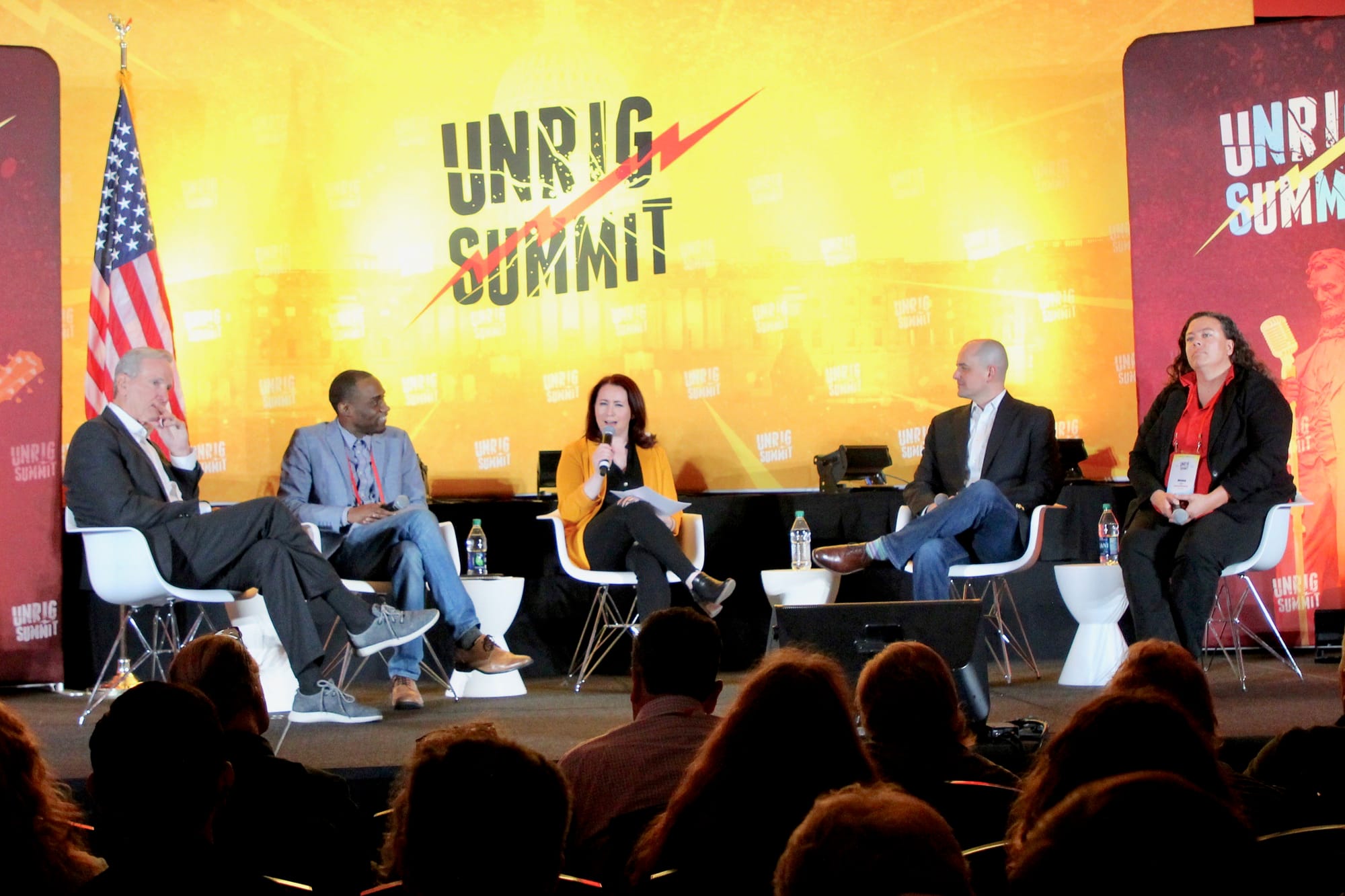
At the Ranked Choice Voting panel on Day 1 of the Unrig Festival, investment banker and RCV advocate Alan Schwartz said: "What is the overlap between the impactful and the possible? We determined Ranked Choice Voting." A pragmatic approach.
What kind of impact does ranked choice voting have on elections? According to Stand Up Republic Director Evan McMullin, it makes them more like real life:
"It seems like we have a system that is built for only two candidates, but that is not our political reality.
The current system sets up a spoiler situation so if someone is running outside of the two major parties, then the way many voters look at them and their candidacy is:
Less viable and a likely 'spoiler' of the election.
I think most people understand that if an independent or third party candidate is running and I cast my vote for them -- even if they’re my preferred candidate -- that may cause the candidate I least want to win the election.
So as a result of the 'spoiler effect,' I’m going to vote for the ‘lesser of two evils.'
That closed system is anathema to the rest of our experience of life where we have more choices about everything else."
FairVote Minnesota organizer Mike Griffin explained how ranked voting unites voters and gives them more reasons to join together over what they have in common instead of letting disagreements divide them.
He illustrated this very well drawing from his experiences campaigning in Minnesota during the Democratic Primary in 2008.
"Any time we knocked on a door and they said they were voting for Hillary Clinton or Jon Edwards, guess what I was telling them? 'Thank you have a good day.' I’m going to go to the next door because time is important. If you liked an opponent and were going to go vote for an opponent that ended the conversation."
With "pick one" voting ballots in most U.S. elections, political activists are currently locked in a zero sum game that keeps people divided into ever more polarized echo chambers.
"But [with ranked choice voting now in place for municipal elections] in Minneapolis," Griffin told attendees, "If you tell me you’re voting for an opponent, I’m going to ask you what issues you care about, and then I’m going to link my candidate to the issues you care about. It helps when you’re campaigning, and it helps when you win, and when you’re governing, you’re governing for the majority."
The election science nerds were in true form at the Unrig Summit, where at times there were fierce debates over the specific nuts and bolts of scientific ballot design.
At the STAR Voting workshop led by election reform activist and permaculture enthusiast Sara Wolk, advocates for Score Then Automatic Runoff (STAR) ballots made the case that ranked choice voting doesn't go far enough to improve election outcomes.
"Ranked choice voting doesn’t eliminated vote splitting," Wolk explained, "You can still have a split vote election that doesn’t elect the right candidate in certain kinds of elections with three or more candidates according to certain studies."
Averring that FairVote has oversold the merits of ranked voting, she pointed out: "They say your vote is never wasted in ranked choice voting because your next vote will be counted if your first choice is eliminated. But if your second or third choice is eliminated in the first round, then you get an 'exhausted ballot,' and when they say a winner is preferred by a majority, it’s not necessarily a majority of all the ballots but a majority of the remaining, non-exhausted ballots."
Wolk got push back from one of the attendees, an advocate for ranked voting, when she opened up the workshop for comments, and a heated debate ensued.
Some of the workshop organizers seemed a bit worried about the conversation being derailed or maybe feelings being hurt, but my feedback for the event organizers for future Unrig Summits is to embrace the controversy and to even spotlight it, especially the technical aspects of ballot and election design, and make sure speakers / debaters are prepared to make it easy for anyone to understand.
Off Topic and Polarizing Issues on The Main Stage of The Unrig Summit
By: Wes Messamore
While I would encourage future summits to embrace and highlight controversies and disagreement in election reform rather than gloss them over at such a prominent gathering of election reform experts and activists, my final advice for the Unrig Summit's organizers is to completely avoid spotlighting and taking sides in highly polarizing non-election reform controversies.
RepresentUs Director Josh Silver gave an impassioned speech at the Unrigged Live event about how the future of the many reform movements in the US is not ideologically-focused. It can't be distracted by ideological divisions or it will not be sustainable. It is going to take more than liberals, more than conservatives, more than independents.
Giving the main stage at the culmination of the event to March for our Lives activist Emma Gonzales to make a very pointed, very partisan, and very condescending speech about gun policy in the United States, however, made many on the right side of the political spectrum feel like the door was not open to them.
Gonzales, a survivor of the Parkland high school shooting, has been through a lot. Her experiences have shaped her perspective in a way I could never understand. This summit, however, is not the appropriate venue to feature one-sided discussions about gun policy, or abortion policy, or immigration policy.
From my point of view, this was an incredible lapse in judgment. As a constitutionalist myself, I felt very alienated, not by the guest speaker, but by the way in which her message was delivered, especially without equal time for someone to offer a different perspective.





